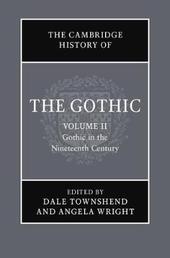
|
The Cambridge History of the Gothic: Volume 2, Gothic in the Nineteenth Century
Hardback
Main Details
Description
This second volume of The Cambridge History of the Gothic provides a rigorous account of the Gothic in British, American and Continental European culture, from the Romantic period through to the Victorian fin de siecle. Here, leading scholars in the fields of literature, theatre, architecture and the history of science and popular entertainment explore the Gothic in its numerous interdisciplinary forms and guises, as well as across a range of different international contexts. As much a cultural history of the Gothic in this period as an account of the ways in which the Gothic mode has participated in the formative historical events of modernity, the volume offers fresh perspectives on familiar themes while also drawing new critical attention to a range of hitherto overlooked concerns. From Romanticism, to Penny Bloods, Dickens and even the railway system, the volume provides a compelling and comprehensive study of nineteenth-century Gothic culture.
Author Biography
Dale Townshend is Professor of Gothic Literature in the Manchester Centre for Gothic Studies, Manchester Metropolitan University. He has published widely on Gothic writing of the eighteenth and nineteenth centuries. His most recent monograph is Gothic Antiquity: History, Romance, and the Architectural Imagination, 1760-1840 (2019). Angela Wright is Professor of Romantic Literature at the University of Sheffield, and a former co-President of the International Gothic Association (IGA). Her books include Britain, France and the Gothic: The Import of Terror, 1764-1820 (Cambridge University Press, 2013), Mary Shelley (University of Wales Press, 2018), and the co-edited volumes Ann Radcliffe, Romanticism and the Gothic (2014, with Dale Townshend) and Romantic Gothic: An Edinburgh Companion (2015, with Dale Townshend).
Reviews'... many readers of The Cambridge History of the Gothic will likely find themselves - and the Gothic - in a similarly transformed and renewed state.' Michael Gamer, Review 19 'One of the great strengths of Townshend and Wright's turn to mode instead of form is that they are able to develop a truly interdisciplinary collection of essays, putting literature, history, art, architecture, and drama into conversation with one another.' Joellen Mary Delucia, Eighteenth-Century Studies
|